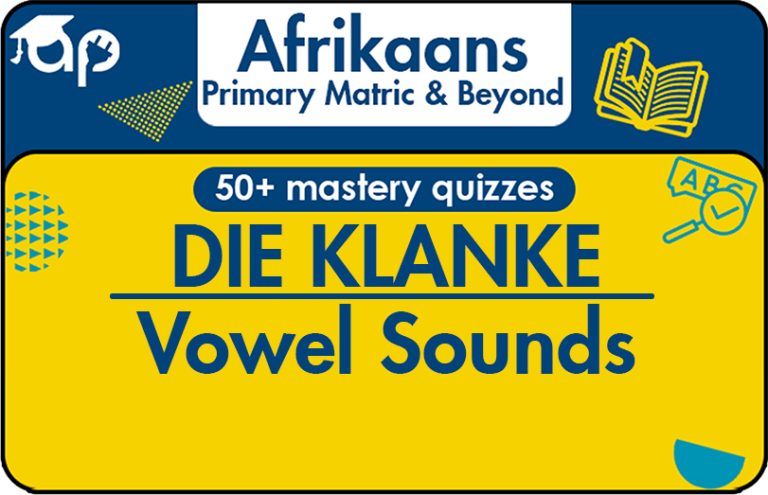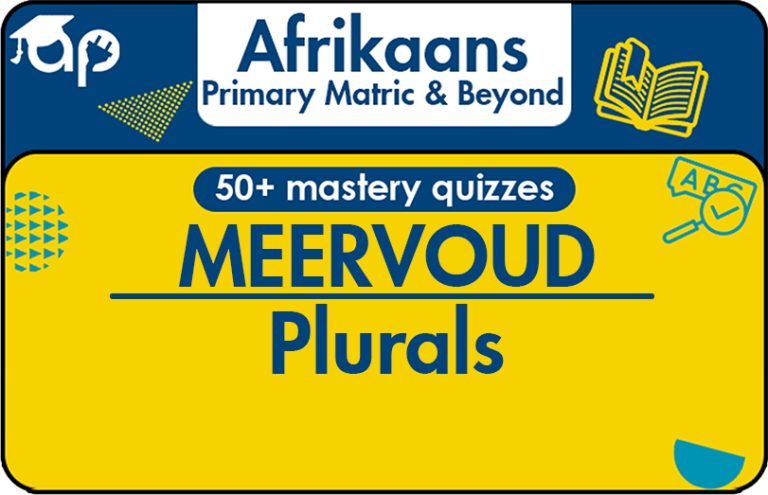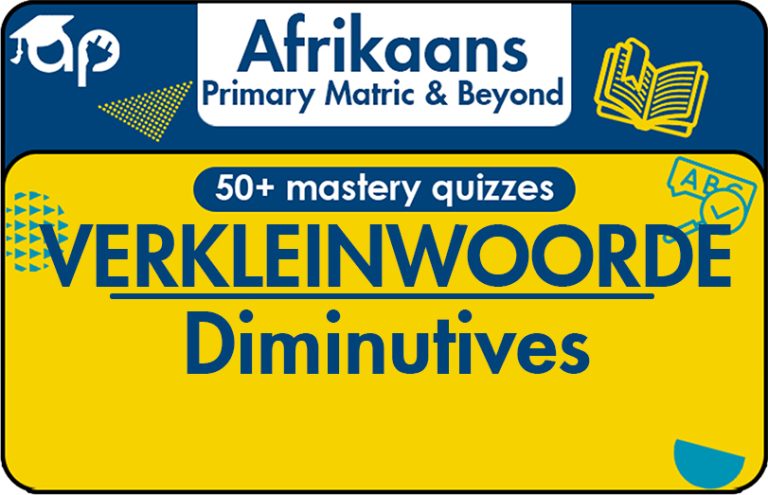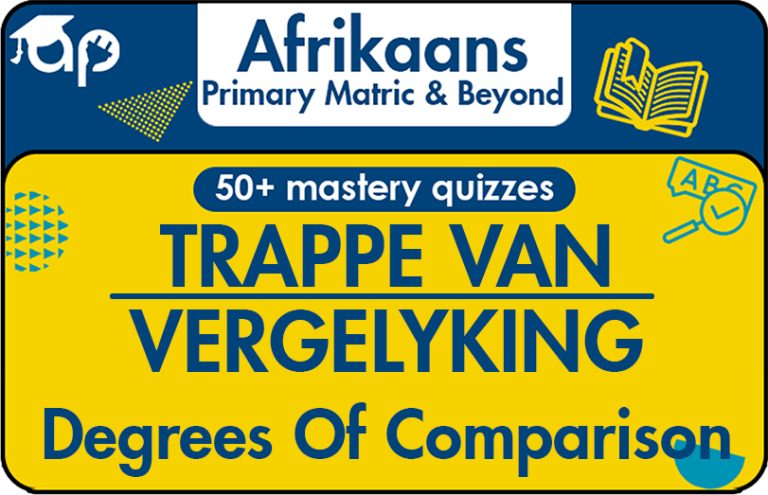DIE TYE: Learn Tenses In Afrikaans Language
- February 2, 2025
- Posted by: admin
- Category: Afrikaans
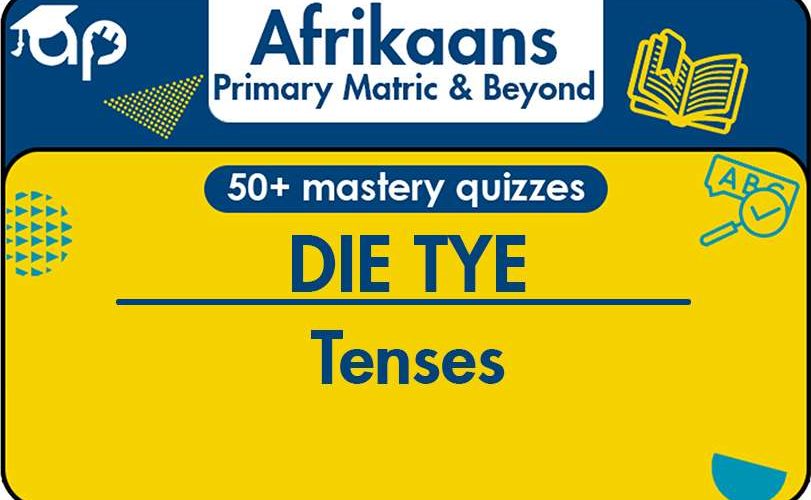
In this page you will learn about DIE TYE/Tenses, a Afrikaans learning topic that is also a recommended learning topic for students in Primary to Matric and Beyond.
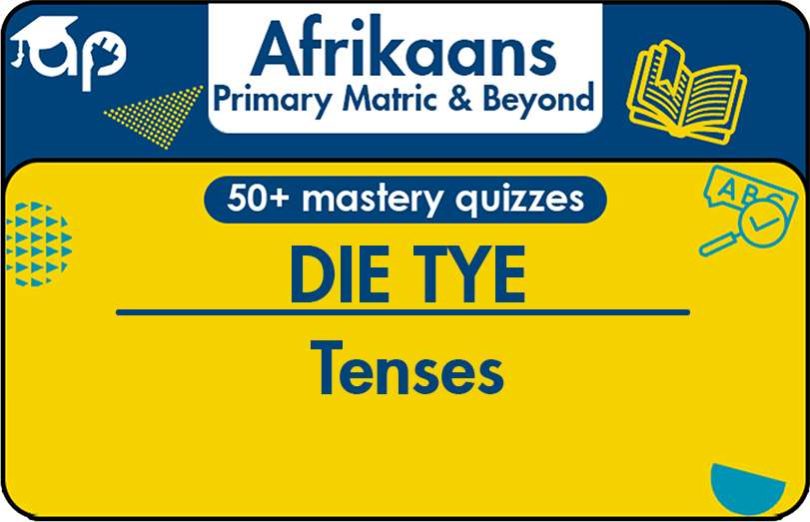
About DIE TYE/Tenses
| TEENWOORDIGE TYD | PRESENT TENSE | (vandag – today) |
| VERLEDE TYD | PAST TENSE |
(gister – yesterday)
|
| TOEKOMENDE TYD | FUTURE TENSE |
(more – tomorrow)
|
IF YOU ARE ASKED TO CHANGE THE TENSE:
- Read the sentence.
- Underline the verbs. (This will tell you which rule to follow.) It is always verb 1 that moves around,
Die seun lees(v1) ‘n boek. Die seun het(v1) ‘n boek gelees(v2). Die seun sal(v1) ‘n boek lees(v2).
- Circle the conjunctions. (If there is a conjunction, it means that there are 2 sentences, both of which need to be changed.)
- Bracket the infinitive (om + te verb) so that you remember to put it to the end. (Sv1TOMPv2l)
 Study And Practice with AI!
Study And Practice with AI!
Plug Bot is an AI you can ask questions as you go through these notes, it is programmed with math curriculum content and it can further your understanding about DIE TYE/Tenses.
1. If there is just a regular verb
If there is just a regular verb we use het + ge for the past tense, and sal for the future tense.
Ek lees ‘n boek.
Ek het ‘n boek gelees.
Ek sal ‘n boek lees.
2. If the verb begins with be, ge, her, er, ont, ver, and mis
If the verb begins with be, ge, her, er, ont, ver, and mis, we get het but no ge in the past tense.
| be | ge | her | er | ont | ver | mis |
| begin | gesels | herken | ervaar | ontmoet | verstaan | misbruik |
| Ek verstaan al my werk. |
Die seun ontmoet sy vriende by die bioskoop.
|
| Ek het al my werk verstaan. |
Die seun het sy vriende by die bioskoop ontmoet.
|
*Exceptions are: gebewe gebêre gebedel
3. If the verb is an is, it changes as indicated:
| Daar is baie mense in Suid-Afrika. |
Die eksamens is maklik.
|
| Daar was baie mense in Suid-Afrika. |
Die eksamens was maklik.
|
| Daar sal baie mense in Suid-Afrika wees. |
Die eksamens sal maklik wees.
|
(If there is a dis, remember to change it to dit is e.g. dis koud = dit is koud)
4. If the verb is a het without the ge, it changes as indicated:
(This het means that you have something.)
| Ek het ‘n mooi huis. |
Die meisie het baie vriende.
|
| Ek het ‘n mooi huis gehad. |
Die meisie het baie vriende gehad.
|
| Ek sal ‘n mooi huis hê. |
Die meisie sal baie vriende hê.
|
5. If the verb is a word, it changes as indicated:
If the verb is a word, it changes as indicated:
| Active: | Passive: |
| Julle word ingenieurs. |
Ek word deur my ma gehelp.
|
| Julle het ingenieurs geword. |
Ek is deur my ma gehelp.
|
| Julle sal ingenieurs word. |
Ek sal deur my ma gehelp word.
|
 Want To Master DIE TYE/Tenses?
Want To Master DIE TYE/Tenses?
Sign up for free and complete the Mastery Quizzes with explained answers to deepen your understanding of this topic.
6. If there is a verb + preposition
If there is a verb + preposition, it becomes one word in the past and future tense,
| Ek tel die boek op. |
Ek gooi die papier weg.
|
| Ek het die boek opgetel. (one word) |
Ek het die papier weggegooi.
|
| Ek sal die boek optel. (one word) |
Ek sal die papier weggooi.
|
7. If there is a helping verb + verb
| Ek moet my werk doen. |
Ek wil ‘n present hê.
|
| Ek moes my werk doen. (gedoen het) |
Ek wou ‘n present hê. (gehad het)
|
| Ek sal my werk moet doen. |
Ek sal ‘n present wil hê.
|
| Ek kan goed swem. |
Ek sal my werk doen.
|
| Ek kon goed swem. (geswem het) |
Ek sou my werk doen. (gedoen het)
|
|
Ek sal goed kan swem.
|
8. If we use the helping verbs
If we use the helping verbs gaan, laat en kom, they go to the end of the sentence just before the verb.
| Ek gaan in die dam swem. | Ek laat my hare groei. |
Ek kom by jou kuier.
|
| Ek het in die dam gaan swem. | Ek het my hare laat groei. |
Ek het by jou kom kuier.
|
| Ek sal in die dam gaan swem. | Ek sal my hare laat groei. |
Ek sal by jou kom kuier.
|
9. If there are two verbs in the same sentence
If there are two verbs in the same sentence, without a conjunction between them, then both verbs go to the end, and verb 1 goes before verb 2. The ge is optional but may only go before verb 1.
| Ek hoor(1) die leeu brul(2). |
Ons sien(1) die man verdrink(2).
|
| Ek het die leeu (ge)hoor brul. |
Ons het die man (ge)sien verdrink
|
| Ek sal die leeu hoor brul. |
Ons sal die man sien verdrink.
|
10. If there are two verbs happening at the same time
| Die man sit en lees op die stoep. |
Hy lê en slaap op die bed.
|
| Die man het op die stoep (ge)sit en lees. |
Hy het op die bed (ge)lê en slaap.
|
| Die man sal op die stoep sit en lees. |
Hy sal op die bed lê en slaap.
|
11. If we get any other combination of verbs connected by en
If we get any other combination of verbs connected by en, then both verbs get a ge in the past tense.
| Ek slaap en werk in my slaapkamer. |
Moeder was en pak die borde weg.
|
| Ek het in my slaapkamer geslaap en gewerk. |
Moeder het die borde gewas en weggepak.
|
| Ek sal in my slaapkamer slaap en werk. |
Moeder sal die borde was en wegpak.
|
12. If there is a conjunction in the sentence
If there is a conjunction in the sentence, we treat it like 2 separate sentences.
*We do sentence 1 as if sentence 2 does not exist; we put in the conjunction, and then we do sentence 2 as if sentence 1 does not exist.
| Die bokkie hardloop weg, | want |
die leeu jaag hom.
|
| Die bokkie het weggehardloop, | want |
die leeu het hom gejaag.
|
| Die bokkie sal weghardloop, | want |
die leeu sal hom jaag.
|
13. The conjunctions dan, as, wanneer and nou (D.A.W.N)
The conjunctions dan, as, wanneer and nou (DAWN) change to toe in the past tense:
Jan doen eers sy huiswerk; dan speel hy in die tuin.
Jan het eers sy huiswerk gedoen; toe het hy in die tuin gespeel.
Ek skrik as ek ‘n slang sien.
Ek het geskrik toe ek ‘n slang gesien het.
Pa luister na die radio wanneer dit nuustyd is.
Pa het na die radio geluister toe dit nuustyd was.
Ek drink nou my koeldrank.
Ek het toe my koeldrank gedrink.
14. If the verbs are skeibare werkwoorde
If the verbs are skeibare werkwoorde, they can be separated into two parts in the present tense, (skei means to separate)
| Ek skakel die lig aan. |
Hy wens my geluk.
|
| Ek het die lig aangeskakel. |
Hy het my gelukgewens.
|
| Ek sal die lig aanskakel. |
Hy sal my gelukwens.
|
We recognise a skeibare werkwoord because the emphasis falls on the first part:
| aantrek | afhaal | deelneem | gelukwens | goedkeur | grootword | liefhê |
| natgooi | saamgaan | stilstaan | uitnooi | uittrek | weggooi |
15. If the verbs are onskeibare werkwoorde
If the verbs are onskeibare werkwoorde:
a. they can never be separated
b. there is no ge in the past tense
| Hy mishandel die hand. |
Hy voltooi die sin.
|
| Hy het die hond mishandel. |
Hy het die sin voltooi.
|
| Hy sal die hond mishandel. |
Hy sal die sin voltooi.
|
We recognise an onskeibare werkwoord, because the emphasis falls on the second part:
| aanvaar | agtervolg | begin | bestaan | betaal | erken | geniet |
| herken | hersien | mislei | mishandel | misluk | omhels | ondersoek |
| ondervind | onthou | ontmoet | oorhandig | oortuig | oorwin | vergeet |
| verstaan | voltooi |
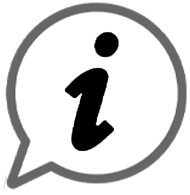 EXCEPTIONS
EXCEPTIONS
The following words are onskeibare werkwoorde, although the emphasis falls on the first part of the word. These words do get a ge in the past tense:
*rotate phone to see the complete table.
| blinddoek | dagvaar | glimlag | handhaaf | hardloop | knipoog | |
| liefkoos | openbaar | raadpleeg | rangskik | regverdig | waarborg | waarsku |
| Sy glimlag vriendelik. | Sy rangskik die blomme. |
Huile waarborg die motor.
|
| Sy het vriendelik geglimlag. | Sy het die blomme gerangskik. |
Huile het die motor gewaarborg.
|
| Sy sal vriendelik glimlag. | Sy sal die blomme rangskik. |
Huile sal die motor waarborg.
|
HOW ‘DIE TYE’ ARE TESTED?
A. Skryf oor in die (a) Verlede Tyd (b) Toekomende Tyd
*Remember to underline the verbs, circle the conjunctions and bracket the infinitives.
- Die eksamen in November is moeiliker as in Junie.
a. Die eksamen in November was moeiliker as in Junie.
b. Die eksamen in November sal moeiliker as in Junie wees. - Ek het griep; daarom gaan ek dokter toe (om ‘n inspuiting te kry).
a. Ek het griep gehad; daarom het ek dokter toe gegaan om ‘n inspuiting te kry.
b. Ek sal griep hê; daarom sal ek dokter toe gaan om ‘n inspuiting te kry.
B. If they begin with a word or words indicating a different time, then you have to continue, using the clues they have given you.
* Try to understand the sentence, underline the verbs, circle the conjunctions and bracket the infinitives.
Die snoepwinkel verkoop heerlike kos.
*It will help you to think what it would be in the past & future tenses.
verkoop ► het(v1) verkoop(v2) ► sal(v1) verkoop(v2)
a. Gister het die snoepwinkel heerlike kos verkoop.
b. Verlede week het die snoepwinkel heerlike kos verkoop.
c. Toe ek skool toe gekom het, het die snoepwinkel heerlike kos verkoop.
d. Môre sal die snoepwinkel heerlike kos verkoop.
e. Volgende week/jaar sal die snoepwinkel heerlike kos verkoop.
f. Wanneer ek skool toe kom, sal die snoepwinkel heerlike kos verkoop.
C. If they give you a sentence and then change it slightly in the sentence below, you must look for the clues and then continue.
*Try to understand the sentence, underline the verbs, circle the conjunctions and bracket the infinitives.
- Ons skool het baie sportsoorte.
Toe ek ‘n leerling was, het ons skool baie sportsoorte gehad.
(They started with a past tense phrase, so they obviously wanted the past tense.) - Ek doen om agtuur elke aand my huiswerk.
Elke aand om agtuur sal ek my huiswerk doen.
*They started with Time, which told you to put the verb next. They put ‘doen’ (and not ‘gedoen’)
at the end, which could only have meant that they wanted the future tense. - Ek huil wanneer ek ‘n treurige rolprent sien.
Ek hetgehuil toe ek ‘n treurige rolprent gesien het.
*The ‘toe’ replaces the ‘wanneer’, which tells you that this sentence must be in the past tense.
 Also get 100% on your exam essays!
Also get 100% on your exam essays!
Our essay cramming assistant is useful if you want to cram essays for subjects such as Business Studies, Economics, Geography, History, Home Languages, First Additional Languages and more…
 Need a Math tutor?
Need a Math tutor?
Start by joining our free sessions with professional math tutors, conducted entirely online for your convenience. Whether you’re at home or on the go, you won’t miss a thing our lessons are live and also recorded for easy access anytime. Plus, students can enquire with our tutors 24/7 for additional support.


